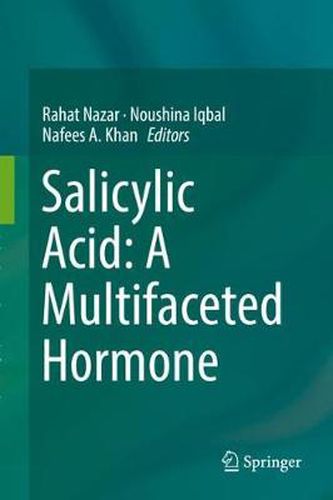Readings Newsletter
Become a Readings Member to make your shopping experience even easier.
Sign in or sign up for free!
You’re not far away from qualifying for FREE standard shipping within Australia
You’ve qualified for FREE standard shipping within Australia
The cart is loading…






This book provides an overview of current knowledge, ideas and trends in the field of induced acclimation of plants to environmental challenges. Presenting recent advances in our understanding of the importance of salicylic acid, it paves the way for deciphering the precise role of salicylic acid in the field of plant physiology, biochemistry and agronomy, and breeding stress-tolerant and high-yielding sustainable transgenic crops. Adopting a mechanistic approach, the book offers valuable information on the role of salicylic acid in combating varied abiotic stresses.
Plants are challenged by biotic and abiotic stresses. They adjust to changing environmental conditions by adopting various measures to induce regulatory self-defense pathways in response to different stresses in order to maintain their genetic potential to optimally grow and reproduce. To minimize cellular damage caused by such stresses, phytohormones provide a number of signaling networks involving developmental processes and plant responses to environmental stress. Phytohormones are potential tools for sustainable agriculture in the future. Significant advances have been made in identifying and understanding plant-hormone signaling, especially salicylic acid.
$9.00 standard shipping within Australia
FREE standard shipping within Australia for orders over $100.00
Express & International shipping calculated at checkout
This book provides an overview of current knowledge, ideas and trends in the field of induced acclimation of plants to environmental challenges. Presenting recent advances in our understanding of the importance of salicylic acid, it paves the way for deciphering the precise role of salicylic acid in the field of plant physiology, biochemistry and agronomy, and breeding stress-tolerant and high-yielding sustainable transgenic crops. Adopting a mechanistic approach, the book offers valuable information on the role of salicylic acid in combating varied abiotic stresses.
Plants are challenged by biotic and abiotic stresses. They adjust to changing environmental conditions by adopting various measures to induce regulatory self-defense pathways in response to different stresses in order to maintain their genetic potential to optimally grow and reproduce. To minimize cellular damage caused by such stresses, phytohormones provide a number of signaling networks involving developmental processes and plant responses to environmental stress. Phytohormones are potential tools for sustainable agriculture in the future. Significant advances have been made in identifying and understanding plant-hormone signaling, especially salicylic acid.